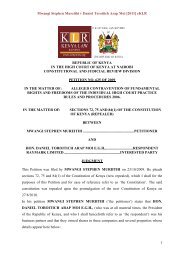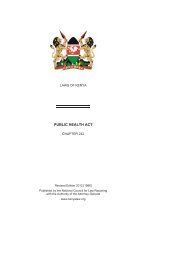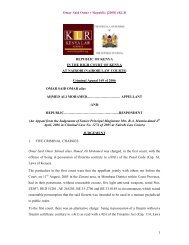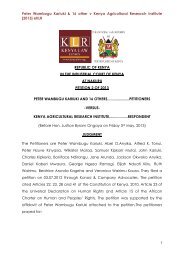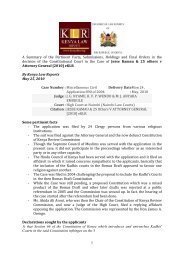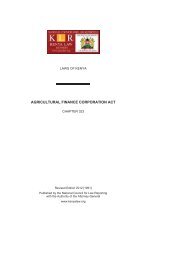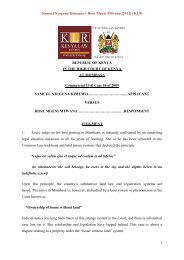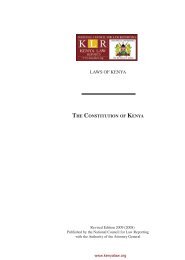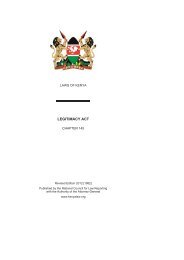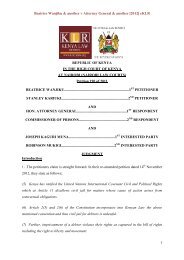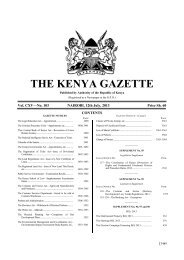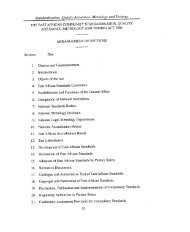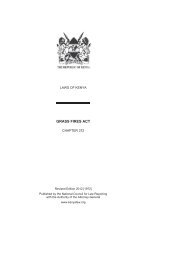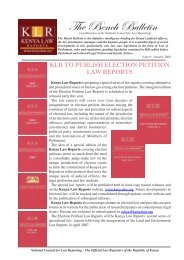Bench Bulletin - Issue 12 - Kenya Law Reports
Bench Bulletin - Issue 12 - Kenya Law Reports
Bench Bulletin - Issue 12 - Kenya Law Reports
You also want an ePaper? Increase the reach of your titles
YUMPU automatically turns print PDFs into web optimized ePapers that Google loves.
KENYA LAW REPORTS<br />
BENCH BULLETIN<br />
FEATURE CASE<br />
Final Orders/Declarations:<br />
• “We grant the declarations sought in prayer 1 limited to declaring that section 66 is inconsistent with sections<br />
65 and 82 and in respect of section 82 is discriminatory to the Applicants in its effect.<br />
• As regards paragraph 2 of the prayers we find and hold that sections 66 and 82 are inconsistent with each<br />
other, and that section 66 is superfluous but it is not the court’s role to expunge it. It is the role of Parliament<br />
and the citizenry in a referendum.<br />
• As regards prayer 3, we hold and declare that any provision similar to section 66 in any other Draft of a<br />
Constitution in word or effect is not ripe for determination.<br />
• The enactment and the application of the Kadhis’ courts to areas beyond the 10 mile Coastal strip of the<br />
Protectorate is unconstitutional.<br />
• We grant prayer 5 that the financial maintenance and support of the Kadhis’ courts from public coffers amounts<br />
to segregation, is sectarian discriminatory and unjust as against the applicants and others and amounts to<br />
separate development of one religion and religious practice contrary to the principle of separation of state and<br />
religion (secularism) and is therefore contrary to the universal norms and principles of liberty and freedom of<br />
religion envisaged under sections 70, 78 and 82 of the Constitution and also against the principle of separation<br />
of state and religion as captioned by section 1A of the Constitution.<br />
• We also find and hold that the purported extension of the Kadhis’ courts through the enactment of the Kadhis’<br />
Courts Act beyond the former Protectorate areas contravenes section 64(4) and section 4(2) (b) of the Kadhis’<br />
Courts Act and is therefore unconstitutional, null and void to the extent of the inconsistency and for that reason<br />
a declaration in terms of prayer 6 is granted.<br />
• We grant a declaration that any form of religious courts should not form part of the Judiciary in the Constitution<br />
as it offends the doctrine of separation of state and religion.<br />
• We grant prayer 13 and declare that the entrenchment of the Kadhi’s courts in the Constitution elevates and<br />
uplifts the Islamic religion over and above the other religions in <strong>Kenya</strong> which is inconsistent with section 78 and<br />
82 of the Constitution and discriminatory in its effect against the applicants and <strong>Kenya</strong>ns of other religions.<br />
• We further find and hold that prayers 9, 10, 11, <strong>12</strong>, 14 & 15 relating respectively to the Bomas Zero Draft and<br />
an Islamic Agenda are matters which are moot and speculative and are not justiciable and decline to grant<br />
them.”<br />
Procedure in the Discipline And Removal of Judges<br />
Republic v Chief Justice of <strong>Kenya</strong> & 6 others ex-Parte Ole Keiwua [2010] eKLR<br />
High Court of <strong>Kenya</strong> at Nairobi<br />
M. Apondi, G. Dulu & M. Warsame JJ<br />
April 20, 2010<br />
Judicial Officer – judge - discipline and removal of judges – disciplinary procedure – power of the Chief Justice to make a<br />
representation to the President that the question of the removal of a judge ought to be investigated – how such power is to<br />
be exercised – role of the Judicial Service Commission before such a power is exercised – whether under the rules of natural<br />
justice and legitimate expectation the judge who is the subject of the representation should be accorded an opportunity to<br />
respond to the allegations against him before the representation is made – where the representation is made before the<br />
judge is heard and a Tribunal appointed to investigate the judge’s conduct – whether the making of the representation<br />
and the appointment of the Tribunal was unconstitutional – matters to which the jurisdiction of such a Tribunal should<br />
be restricted - Constitution section 62.<br />
Immunity – presidential immunity – incidence and scope of the President’s immunity from suit – whether the immunity was<br />
absolute – distinction between the President’s private and personal acts and official acts - whether a sitting President can<br />
be subjected to a court process for violation of the Constitution or the public interest – whether persons exercising duties<br />
embodying the political will of the President immune from judicial review for actions contrary to the law - Constitution<br />
Section 14.<br />
Immunity – judicial immunity – immunity of a judicial officer from suit – immunity of the Chief Justice – scope of the<br />
immunity – distinction between the Chief Justice’s duties as a judge and his duties as the administrator or head of the<br />
Judiciary - whether in the exercise of the latter duties he would be amenable to judicial review and to the supervisory<br />
jurisdiction of the High Court – power to make a representation to the President on the investigation of the conduct of a<br />
judge – how such power is to be exercised - Constitution section 62<br />
Judicial Review – nature and scope of judicial review – whether judicial review proceedings may be brought against a<br />
sitting President and/or the Chief Justice – Constitution section 62.<br />
<strong>Issue</strong> <strong>12</strong>: April-June 2010 31



